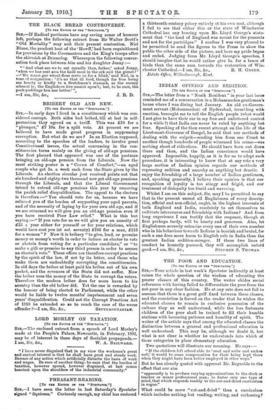BRIBERY OLD AND NEW.
[To THE EDITOR OF THE "SPECTATOR."] SIR,—In early days I lived in a constituency which was con- sidered corrupt. Both sides had bribed, till at last in self- protection they agreed on a tariff. This was 210 for a "plumper," 27 10s. for a split vote. At present we are believed to have made great progress in suppressing corruption. But what do we see ? In an Election supposed, according to the speeches of the leaders, to involve great Constitutional issues, the actual canvassing in the con- stituencies turns mainly on the giving of old-age pensions. The first placard that appeared was one of the postman bringing an old-age pension from the Liberals. Now the most striking poster is a "Crown of Comfort,"—an aged couple who get 5s. a week each from the State given by the Liberals. An election circular just received points out that six hundred and eighty-two thousand now get old-age pensions through the Liberals, and that the Liberal Government intend to extend old-age pensions this year by removing the parish relief disqualification. The appeal to the electors
is therefore You should vote for us, because we have relieved you of the burden of supporting your aged parents, and of the necessity of laying by for your own old age, and if we are returned we will give you an old-age pension even if you have received Poor Law relief." What is this but
saying If you vote for us we will give you an annuity of 213 a year either for yourself or for your relations, which would have cost you (at aet. seventy) 2103 for a man, 2113 for a woman " ? Now it is bribery "to give, lend, or promise money or money's worth in order to induce an elector to vote or abstain from voting for a particular candidate," or "to make a gift or promise to any third person in order to secure an elector's vote." These offers are therefore corrupt practices by the spirit of the law, if not by its letter, and those who make them are undoubtedly corrupting the constituencies. In old days the briber at least paid his bribes out of his own pocket, and the revenues of the State did not suffer. Now the briber uses the money of the State to corrupt the voters. Therefore the modern briber does far more harm to his elountry than the old briber did. Yet the one is rewarded by the honour of being elected to Parliament, while the other would be liable to twelve months' imprisonment and seven years' disqualification. Could not the Corrupt Practices Act of 1883 be extended so as to reach the case of the worse






















































 Previous page
Previous page